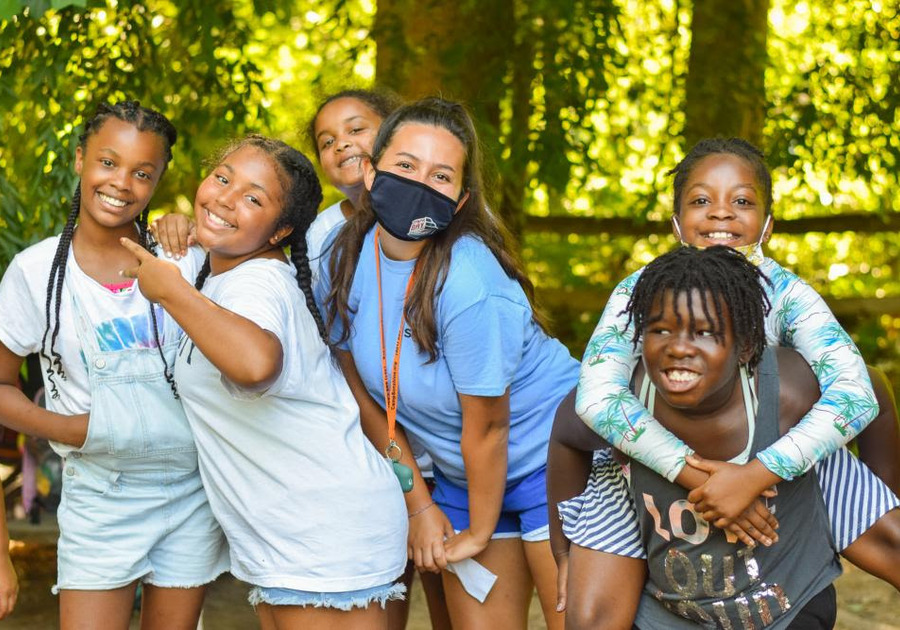As our children’s social worlds begin to expand and return to a new normal after so many unknowns, parents are wondering how to best prepare young kids to make friends outside the home. And to be honest, it can feel overwhelming for both kids and grown-ups. My son often reminds me of something when we’re working through big feelings and life transitions: “Well, you never lived through a pandemic as a kid!” And he’s right!
A year and half isn’t so long for grown-ups, but my 5-year-old has spent a quarter of his life primarily playing with his siblings at home, missing out on a typical preschool experience. Every family has a different comfort and safety level, and I’m working to prepare my kids to know their personal boundaries and respect others’ boundaries, too. As my family arranges to interact more with neighbors and plans for school, I talked with Dr. Traci Baxley — a parenting coach, educator, and mother of five — about how to navigate nerves, ease anxieties, and empower little ones as we ease into more social situations.
“The isolation — when we needed each other the most — was the hardest. It impacted our mental health and our children’s mental health,” Dr. Baxley said. “In a world that needed more compassion and connection during the pandemic and social unrest, our kids got denied all of that. The basic human connection was missing in a time when we needed that the most.”
Here are some tips she shared with me for helping kids make friends and build social resilience in this transition time after a tough year.
- Be ready to provide extra support. “I think there’s going to be an extra layer of support needed. As we’re coming out of this unprecedented time, I think a little more hand-holding in the beginning is warranted,” Dr. Baxley said. “I think parents should be very patient with their children. Be a safe space for them to be able to deal with those feelings.” Dr. Baxley also said sharing our experiences and emotions normalizes the varied feelings our kids might be holding. “Offer your kids a time that you felt the same way, so they know it’s common. Say something like, ‘I remember how I felt when I had to go back to work’ or ‘I remember when I moved to a new school’ — normalize those feelings for them.”
- Stay positive. “The more we can teach them about the power of friendship in a positive way is important,” Dr. Baxley said. “Friendship teaches them empathy and compassion, how to trust, and how to be vulnerable. It teaches them how to treat others, how to trust, how to be open-hearted, and how to create safe boundaries for themselves, too.”
- Be proactive, but start small. When approaching a big change, like entering the school building after doing remote learning or joining a new playgroup for the first time, Dr. Baxley said to start small. “Be proactive in trying to create small circles or spaces for them to socialize, or try to arrange more one-on-one playdates or outings.” For kids returning to school after time away, she suggests taking advantage of fall orientations or back-to-school nights to not only meet the teacher, but perhaps get introduced to a new friend, too.
- Play pretend. “I always think things work better when you role play at home,” Dr. Baxley says. “The more you can anticipate things, the better.” She recommends playing with puppets to act out different situations that may arise when your child interacts with peers. Pretend to be a new friend asking to play or have one of your characters be nervous about not knowing anyone. “Going through these roles and scenarios in their mind can help them feel relaxed,” Dr. Baxley said. “When things come up, they’re going to say, this feels familiar.”
- Remember your people. It’s normal for kids (and grown-ups!) to feel anxious when experiencing big life transitions or forging new relationships. If your little one is feeling nervous about heading back to school or having playdates at the park, Dr. Baxley recommended reminding children who’s in their corner. “It’s important to talk to your child about who their team is. Ask them, ‘If you're feeling anxious, who are the people you can talk to?’” Those people may be parents, grandparents, siblings, teachers, guidance counselors, or even a new friend.
- Make a plan. What can your child say or do if they’re feeling left out? What will they do if they’re in a new space where they don’t know anyone? Will they (or others) be wearing a mask? Having a plan helps your child navigate new social spaces. “Help them brainstorm ideas about what to say when situations are hard,” Dr. Baxley said.
- Bring in the pros. When approaching transitions, talking it out with a mental health professional can be helpful for kids and parents alike. If that’s not an option, Dr. Baxley suggested being in touch with your child’s guidance counselor. “I’m a big believer in getting professional help. Be open to getting support both at school and outside of school,” Dr. Baxley said. “A lot of times, if guidance counselors know there are issues, they’ll create special small groups for kids.”
- Share your perspective. As I parent my four young kids, I know each one brings a unique perspective to their approach in making new friends and casting a wider social circle. They’re holding so many emotions all at once — excitement and anxiety, happiness and nervousness — and if I’m being honest, so am I! Dr. Baxley said that it’s good to acknowledge our multifaceted feelings with our kids so they know they’re not alone in having different emotions (like Daniel Tiger feeling two feelings at the same time!). “Model to your kids how to handle those emotions: deep breaths, meditating, writing out in a journal… let them see you use strategies that they can also do.” We are also going to be trying these self-care tips for kids.
As parents and caregivers, we’ve seen the youngest among us grow resilient in unknowns and become courageous in challenging times. With compassion and care, we can honor their emotions and help them create strong foundations from which they can build a lifetime of friendships.



